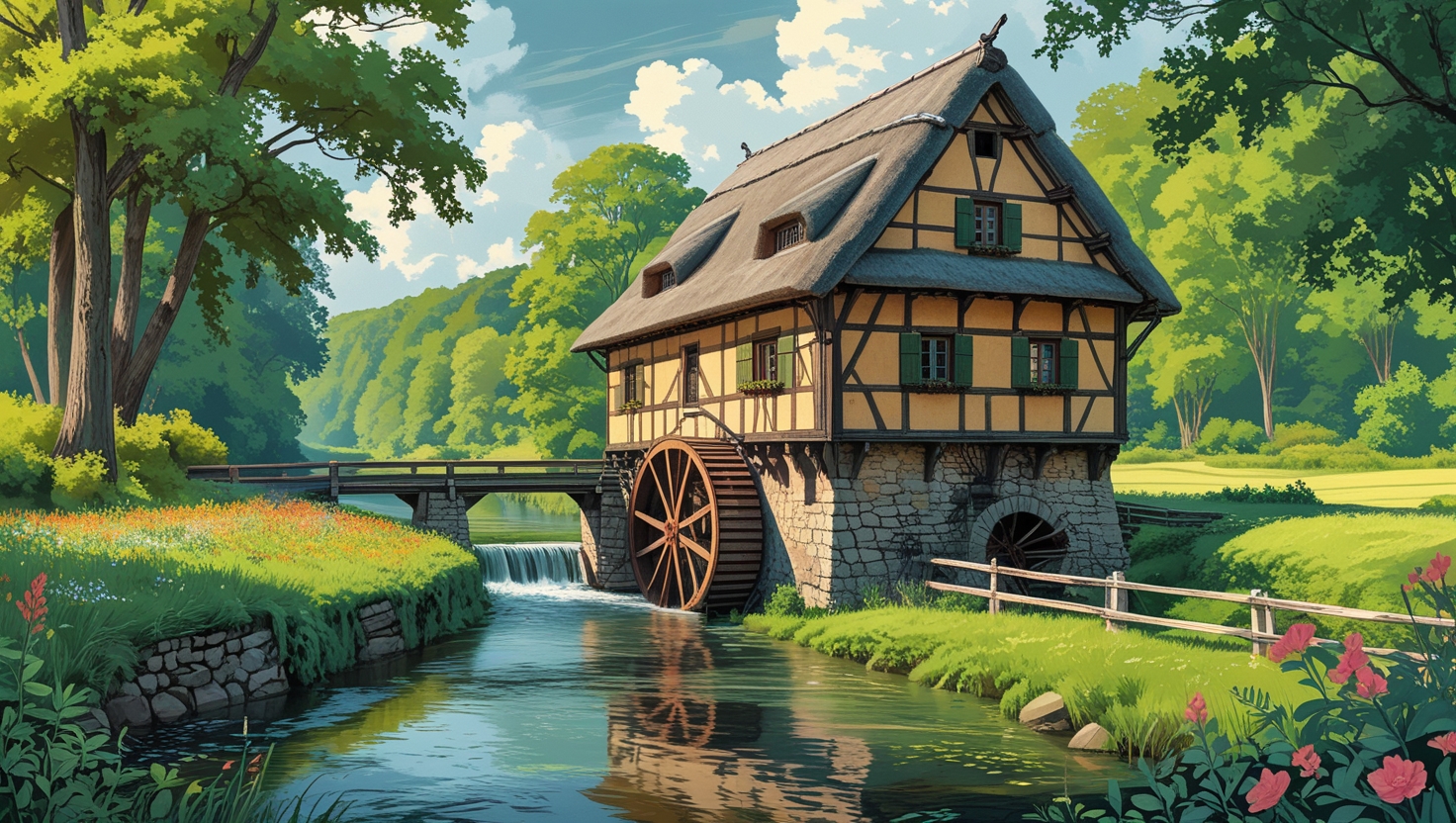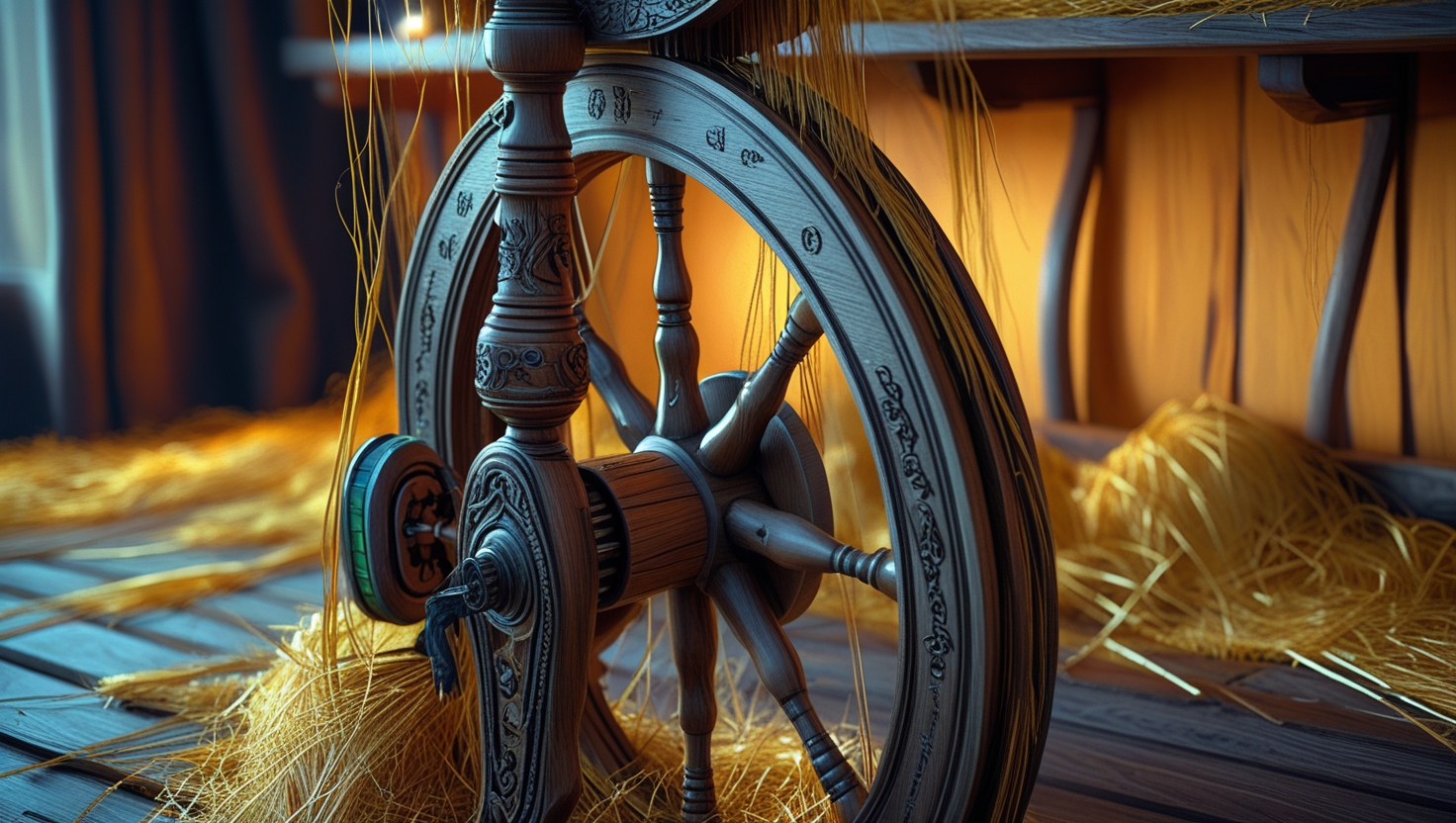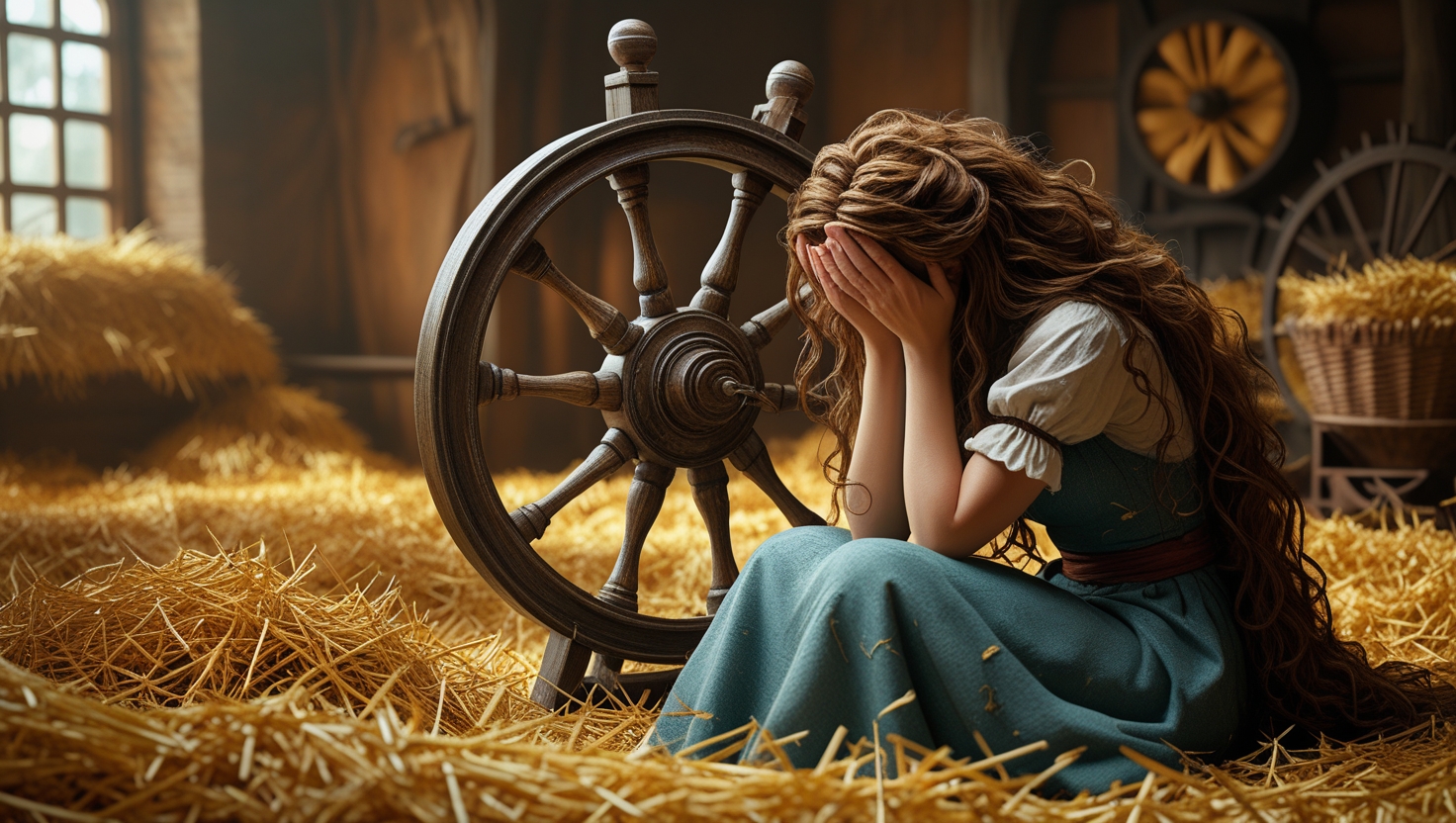Grimm Fairy Tale
Rumpelstiltskin Story (Rumpelstilzchen)
From the Brothers Grimm. Includes a bilingual (German & English) edition.
Once upon a time, a poor miller boasted that his daughter could spin straw into gold. What followed was a tale of greed, bargains, and a mysterious little man who demanded more than gold in return.
(Bilingual edition — German original with a smooth, faithful English translation)

Es war einmal ein Müller, der war arm, aber er hatte eine schöne Tochter. Nun traf es sich, daß er mit dem König zu reden kam, und um sich ein Ansehen zu geben, sagte er zu ihm: „Ich habe eine Tochter, die kann Stroh zu Gold spinnen.“
Once there was a poor miller who had a beautiful daughter. One day he happened to speak with the king, and, wanting to appear important, he boasted, “I have a daughter who can spin straw into gold.”

Dem König gefiel das Gold gar wohl, und er war habsüchtig danach; darum befahl er dem Müller, seine Tochter am andern Tag vor ihn zu bringen.
The king, who was very fond of gold and greedy for it, commanded the miller to bring his daughter before him the next day.

Als das Mädchen zu ihm kam, führte er es in eine Kammer, die ganz voll Stroh lag, gab ihm Rad und Haspel und sprach: „Geh ans Werk; wenn du bis morgen früh dieses ganze Stroh nicht zu Gold gesponnen hast, so mußt du sterben.“ Darauf ließ er die Kammer zuschließen, und das Mädchen blieb allein darin.
When the girl was brought to him, he led her into a chamber filled from floor to ceiling with straw. He gave her a spinning wheel and reel, and said, “Set to work; if by morning you have not spun all this straw into gold, you shall die.” Then he locked the chamber, leaving her alone.

Da saß nun das arme Müllerskind und wußte sich vor Angst nicht zu helfen; sie hatte gar keine Ahnung, wie man Stroh zu Gold spinnen könnte, und ihr Jammer ward immer größer, bis sie endlich bitterlich zu weinen anfing.
The poor miller’s daughter sat there in terror, not knowing what to do. She had no idea how one might spin straw into gold, and her despair grew until at last she began to weep bitterly.
Da ging auf einmal die Türe auf, und es trat ein kleines Männchen herein und sprach: „Guten Abend, Jungfer Müllerin, warum weint Ihr so?“ — „Ach,“ antwortete das Mädchen, „ich soll Stroh zu Gold spinnen, und ich kann es nicht.“ — Da sprach das Männchen: „Was gibst du mir, wenn ich dir das Spinnen tue?“ — „Mein Halsband,“ sagte das Mädchen. Das Männchen nahm das Halsband, setzte sich vor das Rad, und „schnurr, schnurr, schnurr“ – dreimal um – war die Spule voll. Dann nahm es eine zweite, und bis zum Morgen war alles Stroh zu Gold gesponnen.
Suddenly the door opened, and in stepped a little man who said, “Good evening, miller’s daughter, why are you crying so?” “Alas,” she answered, “I must spin straw into gold, and I cannot.” Then the little man said, “What will you give me if I spin it for you?” “My necklace,” said the girl. The little man took the necklace, sat down at the wheel, and whirr, whirr, whirr—three turns and the bobbin was full. Then another; and by morning all the straw had been spun into gold.
Als der König am Morgen kam und das Gold sah, erstaunte er und freute sich sehr; aber sein Herz ward nur noch habsüchtiger. Er ließ das Mädchen in eine zweite Kammer bringen, die noch größer war als die erste und auch mit Stroh angefüllt, und befahl, es in einer Nacht alles zu Gold zu spinnen, wenn ihm das Leben lieb sei.
When the king came in the morning and saw the gold, he was astonished and overjoyed; but his heart only grew greedier. He had the girl taken to a second chamber, larger than the first and filled with straw, and commanded her to spin all of it into gold in one night, if she valued her life.
Das Mädchen weinte wieder; da erschien zum zweitenmal das Männchen und sprach: „Was gibst du mir, wenn ich dir wiederum spinne?“ — „Meinen Ring von der Hand,“ sagte sie. Das Männchen nahm den Ring, spann die ganze Nacht, und am Morgen lag all das Stroh in Gold verwandelt.
The girl wept again; then the little man appeared a second time and said, “What will you give me if I spin for you again?” “My ring from my finger,” she said. The man took the ring, spun through the night, and in the morning all the straw lay turned to gold.
Der König freute sich noch mehr, war aber noch immer nicht zufrieden und ließ sie in eine noch größere Kammer voll Stroh bringen. „Das mußt du diese Nacht spinnen,“ sprach er, „und wenn dir das gelingt, sollst du meine Königin werden.“ (Denn er dachte: sie ist zwar nur eines Müllers Tochter, aber eine reichere Frau kann ich wohl keine finden.)
The king was even more pleased, yet still not satisfied, and had her taken to an even larger room full of straw. “This you must spin tonight,” he said, “and if you succeed, you shall be my queen.” (For he thought: she may be only a miller’s daughter, but I can scarcely find a richer wife.)
Als das Mädchen allein war, kam das Männchen zum drittenmal und sprach: „Was gibst du mir, wenn ich dir noch diesmal das Stroh spinne?“ — „Ich habe nichts mehr, das ich geben könnte,“ sagte das Mädchen. — „So versprich mir,“ sprach das Männchen, „wenn du Königin wirst, dein erstes Kind.“ In ihrer Not versprach es das Mädchen; und das Männchen spann noch einmal alles Stroh zu Gold.
When the girl was alone, the little man came a third time and said, “What will you give me if I spin the straw for you once more?” “I have nothing left to give,” said the girl. “Then promise me,” said the man, “that when you are queen you will give me your first child.” In her desperation the girl promised it; and the little man spun all the straw to gold once again.
Als der König am Morgen alles nach Wunsch fand, nahm er sie zur Frau, und die schöne Müllerstochter ward Königin. Nach einem Jahr brachte sie ein Kind zur Welt und vergaß ganz das Männchen. Da trat es plötzlich in ihre Kammer und sprach: „Nun gib mir, was du versprochen hast.“
When the king found everything as he wished in the morning, he married her, and the beautiful miller’s daughter became queen. A year later she bore a child and completely forgot the little man. Then he suddenly stepped into her chamber and said, “Now give me what you promised.”
Die Königin erschrak heftig und bot ihm alle Schätze des Königreichs an, wenn er ihr das Kind lassen wollte. Aber das Männchen sprach: „Nein, etwas Lebendes ist mir lieber als alle Schätze der Welt.“ Die Königin weinte und bat so lange, bis es Mitleid hatte und sprach: „Drei Tage gebe ich dir Frist; weißt du in der Zeit meinen Namen zu nennen, so sollst du dein Kind behalten.“
The queen was horrified and offered him all the treasures of the kingdom if he would let her keep the child. But the little man said, “No, something living is dearer to me than all the treasures of the world.” She wept and pleaded until he took pity and said, “I will give you three days. If in that time you can tell me my name, you may keep your child.”
Die Königin dachte die ganze Nacht an alle Namen, die sie je gehört hatte, und sandte Boten im ganzen Land umher, seltene und sonderbare Namen zu erkunden. Als am nächsten Tag das Männchen kam, fing sie an: „Heißest du Kaspar, Melchior, oder Balthasar?“ Sie sagte alle Namen, die sie wußte, einen nach dem andern; aber bei jedem sprach das Männchen: „So heiße ich nicht.“
The queen thought all night of every name she had ever heard and sent messengers throughout the land to seek out rare and unusual names. When the little man came the next day, she began: “Is your name Caspar, Melchior, or Balthazar?” She said every name she knew, one after another; but at each the little man replied, “That is not my name.”
Am zweiten Tag erkundigte sie sich in der Nachbarschaft, wie die Leute ihre Kinder hießen, und sagte dem Männchen die sonderbarsten Namen vor: „Heißt du Rippenbiest? Schafbein? Schnürbein?“ Aber es antwortete immer: „So heiße ich nicht.“
On the second day she inquired around the neighborhood what people named their children, and recited to the little man the strangest names she could find: “Beastyribs? Sheepshanks? Laceleg?” But he always answered, “That is not my name.”
Am dritten Tag kam der Bote zurück und sprach: „Neue Namen habe ich nicht finden können; aber wie ich an einen hohen Berg an den Wald kam, wo Fuchs und Hase einander gute Nacht sagen, sah ich ein kleines Haus. Vor dem Hause brannte ein Feuer, und um das Feuer sprang ein gar lächerliches Männchen auf einem Bein und sang:
Heute back ich, morgen brau ich,
übermorgen hol ich der Königin ihr Kind;
ach, wie gut, daß niemand weiß,
daß ich Rumpelstilzchen heiß!
“
On the third day the messenger returned and said, “I could find no new names; but as I came upon a high mountain at the edge of the forest, where fox and hare bid each other good night, I saw a little house. Before the house a fire was burning, and around the fire a most ridiculous little man hopped on one leg and sang:
Today I bake, tomorrow I brew,
the next day I’ll take the young queen’s child;
ha! how glad I am that no one knows
that my name is Rumpelstiltskin!
Die Königin freute sich, als sie den Namen hörte. Als am Abend das Männchen kam, fragte es: „Nun, Frau Königin, wie heiß ich?“ Zuerst sprach sie: „Heißest du Konrad?“ — „Nein.“ — „Heißest du Heinz?“ — „Nein.“ — „So heißt du gewiß Rumpelstilzchen!“
The queen rejoiced when she heard the name. That evening, when the little man came, he asked, “Well then, Your Majesty, what is my name?” She began, “Are you called Conrad?” “No.” “Heinz?” “No.” “Then surely your name is Rumpelstiltskin!”
„Das hat dir der Teufel gesagt! Das hat dir der Teufel gesagt!“ schrie das Männchen, stampfte vor Zorn mit dem rechten Fuß so tief in die Erde, daß es bis an die Hüfte hineinfuhr, faßte mit beiden Händen den linken Fuß und riß sich mitten entzwei.
“The devil told you that! The devil told you that!” screamed the little man, and in his rage he stamped his right foot so deep into the floor that it sank up to his hip; then, seizing his left leg with both hands, he tore himself in two.
- Summary
- Meaning
- Pop Culture